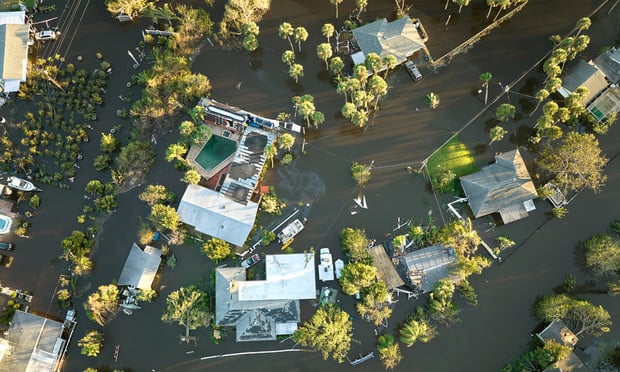The U.S. Court of Appeals for the Fifth Circuit has overturned one of the first wind-versus-water cases to reach verdict following Hurricane Katrina by ruling in favor of defendant State Farm, granting the insurer a new trial, and removing $1 million in punitive damages that were awarded in the case.
The case in question involved Broussard v. State Farm, which was decided by U.S. District Judge L.T. Senter. The Broussard's home was destroyed down to the slab following Hurricane Katrina, but the issue of whether wind or storm surge was at fault for the loss brought the case to the courts. Under most homeowners' polices, storm surge and flooding from hurricanes are excluded and covered only through a separate policy purchased from the government-funded National Flood Insurance Program. Losses due to wind, however, typically are covered.
In situations where the cause of the loss cannot be determined, it has generally been the burden of the insurance company to prove the extent of the loss attributable to water and to pay for any wind damage. If the loss cannot be attributed -- as in the Broussard case in which nothing was left but a concrete slab -- the insured is given the benefit of the doubt. Insurers had attempted to deal with this situation by including anti-concurrent causation exclusions in homeowners' policies, but in a separate case decided prior to Broussard, Judge Senter ruled that the language was ambiguous.
On Jan. 11, 2007, Judge Senter made an unusual move by issuing a bench verdict against State Farm, which prevented the jury in the case from issuing its own decision. In an article that appeared in Claims' April 2007 issue, Attorney Jay Brown speculated that Judge Senter did so due to the evidence being "so overwhelming against State Farm that no reasonable jury could find in the insurance company's favor." Brown went on speculate that it also seemed as though the judge felt there was an absence of credible testimony by State Farm, since he also ruled that the carrier did not offer adequate evidence at trial to meet the burden of allocation.
In the most recent decision, the court of appeals held that the district court erred in entering a judgment as a matter of law for the Broussards. The appeals court further found that the district court erred by even submitting the question of punitive damages to the jury, thus vacating the $1 million that was awarded to the Broussards above and beyond their policy's limits.
"This ruling confirms our belief the jury should have been given an opportunity to evaluate the question of what damage was caused by wind and what damage was caused by water," said State Farm, in a release found on their web site. "The ruling also confirmed our belief that the claim was handled reasonably and per the contract, and, therefore, there was no basis for punitive damages. Our appeal in this case was important to ensure court rulings remain consistent with the evidence presented at trial, the law, and an accurate interpretation of the insurance contract."
Interested in more legal news and in-depth articles? Head over to Claims' legal channel for more information.
Want to continue reading?
Become a Free PropertyCasualty360 Digital Reader
Your access to unlimited PropertyCasualty360 content isn’t changing.
Once you are an ALM digital member, you’ll receive:
- Breaking insurance news and analysis, on-site and via our newsletters and custom alerts
- Weekly Insurance Speak podcast featuring exclusive interviews with industry leaders
- Educational webcasts, white papers, and ebooks from industry thought leaders
- Critical converage of the employee benefits and financial advisory markets on our other ALM sites, BenefitsPRO and ThinkAdvisor
Already have an account? Sign In Now
© 2024 ALM Global, LLC, All Rights Reserved. Request academic re-use from www.copyright.com. All other uses, submit a request to [email protected]. For more information visit Asset & Logo Licensing.








